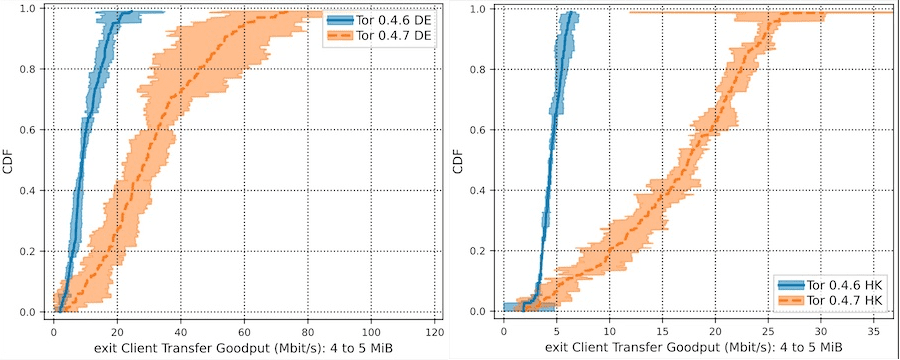Tor's Congestion Control feature promises improved performance

Tor Project released a new version of Tor, version 0.4.7.7, on May 4, 2022 to the public. Tor 0.4.7.7 is the first version of the service that supports congestion control, a new feature designed to reduce latency and eliminate speed limits in Tor.

In order for users to benefit from the new features, Exit relay operators need to upgrade the installed Tor version to the new release.
Congestion Control "is an adaptive property of distributed networks, whereby a network and its endpoints operate such that utilization is maximized, while minimizing a constraint property" according to the release information.
Tor's primary mission is to provide Internet users with tools to fight censorship, tracking and surveillance. Users from all over the world may download Tor Browser to connect to the network. One of its core mechanics is that traffic is routed through a series of hops. Each hop has knowledge about the previous and the next hop, but no individual hop knows the origin and the target of the user request.
Traffic congestion has been an issue for a long time on the network. While things have improved since the early beginnings of Tor, with extreme wait times of up to a minute for page loading requests, it has been clear that the lack of congestion control was slowing down the network for its users.
The maintainers note that Tor's cryptographic design prevented it from using mechanisms such as packet drops or reordering to deal with traffic congestion. "Nearly two decades" of research resulted in "a very small class of candidate algorithms to consider" according to the project. Of these three, the maintainers picked Tor-Vegas, as the other candidates "exhibited ack compression", which "caused them to wildly overestimate the Bandwidth-Delay product, which lead to runaway congestion conditions".
Tests confirmed that Tor-Vegas does away with the speed limit of earlier versions of Tor without impacting end-to-end latency. The entire Tor Network will run at full capacity, once Tor servers have been upgraded to the new version. Only exit notes need to be updated for this effect, but non-exit relay operators may notice increased bandwidth usage.
Closing Words
Tor users should notice performance improvements once the majority of exit nodes have been upgraded to the new release version. Users of Brave Browser, which supports Tor, should also benefit from this improvement.
Now You: have you used Tor? Did you experience slow-downs while using the network?





















thanks for info
Tor is almost unusable after the last update, the metrics show strange traffic, it reminds me the deep package inspection attacks that Rob Braxman had experienced with his VPN about a year ago, they suffocate the network with traffic.
@David:
Just download The Tor Browser and use that, or maybe even Tails Linux if you feel the need.
You may need a rolling release because when I went through all the steps it complained that my version of runit-helper was too old:
The following packages have unmet dependencies:
tor : Depends: runit-helper (>= 2.10.0~) but 2.8.14ubuntu2 is to be installed
It’s not nearly as slow as it was 5 years ago. With a good connection you can play most videos without noticeable lag.
Another nice improvement in recent months is that you can open a connection and keep using it throughout the day. In the past, a connection would degrade the longer you had it open, to the point where it was unusable after a couple of hours.
This is exciting news. I look forward to testing it later in 2022.
Out of curiosity, what do you use Tor or Tor browser for?
Thanks for covering this.
Tor users of all kinds should know about the Official Tor Forum:
https://forum.torproject.net/
It’s really a great bunch of people.